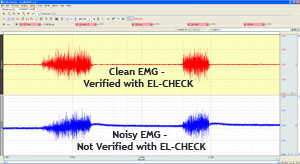Electrode Impedance Checker helps you record great data
Now available from BIOPAC… EL-CHECK Impedance Checker
Add the EL-CHECK to your recording protocol to measure the impedance between surface electrodes attached to a subject before you begin recording…then correct any noise issues before you begin to record great data!

EL-CHECK is suitable for measuring electrode contact impedance for all surface biopotential measurements, including those for ECG, EEG, EGG, EMG, EOG, Bioimpedance and Impedance Cardiography. The EL-CHECK permits simultaneous connection of up to three electrode leads, for quick impedance checking between any two electrodes.
Electrode Impedance Range Indicators: < 5 kΩ, 5-10 kΩ, 10-20 kΩ, 20-30 kΩ, 30-40 kΩ, 40-50 kΩ, > 50 kΩ
Lead Compatibility: Standard female Touchproof (1.5 mm) electrode leads, all BIOPAC electrodes and leads that terminate in female Touchproof sockets, all BN-EL and BN-Adapt series.
Testing Configurations – Switch Selectable: Active (Vin+) to Reference (Vin-), Active (Vin+) to Ground (GND), Reference (Vin-) to Ground (GND)
Stay Connected